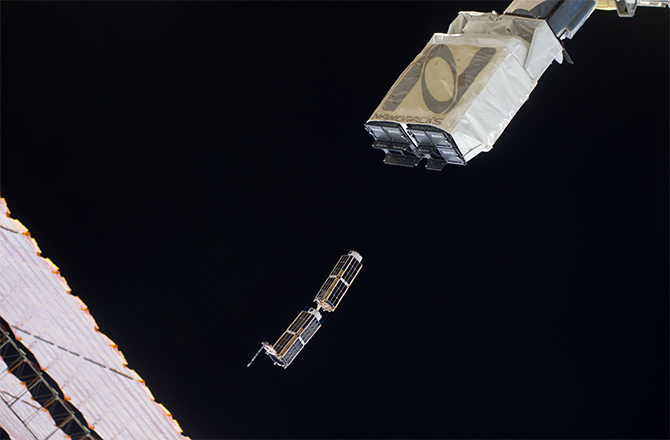Space Station's Cubesat Launcher Has Mind of Its Own

Breaking space news, the latest updates on rocket launches, skywatching events and more!
You are now subscribed
Your newsletter sign-up was successful
Want to add more newsletters?
Last week, two more of Planet Lab's shoebox-sized Earth imaging satellites launched themselves from aboard the International Space Station, the latest in a series of technical mysteries involving a commercially owned CubeSat deployer located outside Japan’s Kibo laboratory module.
Station commander Steve Swanson was storing some blood samples in one of the station’s freezers Friday morning when he noticed that the doors on NanoRack's cubesat deployer were open, said NASA mission commentator Pat Ryan.
ANALYSIS: ISS Astronauts Fire-Up Awesome 'Cubesat Cannon'
Flight controllers at the Johnson Space Center in Houston determined that two CubeSats had been inadvertently released. [CubeSat Photos: Tiny Satellites Launched from Space Station]
"No crew members or ground controllers saw the deployment. They reviewed all the camera footage and there was no views of it there either," Ryan said.
The satellites, owned by San Francisco-based Planet Labs, are part of a planned 100-member network designed to collect images of the entire Earth every 24 hours.
So far, 12 of 32 CubeSats delivered to the space station aboard a Cygnus cargo ship in July have been deployed, including four launched inadvertently, said NanoRacks spokeswoman Abby Dickes.
Breaking space news, the latest updates on rocket launches, skywatching events and more!
Satellite 'Flock' Launched From ISS Cubesat Cannon: Photos
In addition to the two Planet Labs satellites launched Thursday night, two more of the company’s satellites were released accidentally Aug. 23, a NASA status report shows.
The latest inadvertent deployment followed unsuccessful attempts Wednesday night to return NanoRack's CubeSat dispenser to service. Troubleshooting efforts included jiggling the small robotic arm holding the dispenser in an attempt to get its doors to open, Ryan added.
Flight control teams are assessing whether to bring the deployer back inside the station or to try to release the remaining CubeSats still awaiting launch.
This article was provided by Discovery News.

Irene Klotz is a founding member and long-time contributor to Space.com. She concurrently spent 25 years as a wire service reporter and freelance writer, specializing in space exploration, planetary science, astronomy and the search for life beyond Earth. A graduate of Northwestern University, Irene currently serves as Space Editor for Aviation Week & Space Technology.
